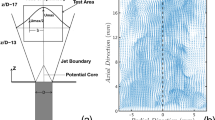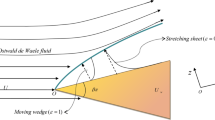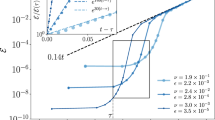Abstract
THE experiments of Bénard, and the theoretical discussion by the late Lord Rayleigh, referred to by Major Low, deserve careful consideration from the point of view of their application in meteorology. Rayleigh showed that a layer of fluid can remain stable, even with the denser fluid above, in virtue of its conduction and viscosity. In the atmosphere it is customary to regard stability as associated with a fall of temperature with height limited by the adiabatic lapse-rate, 1° C. per 100 metres for dry air, a greater lapse-rate, or fall of temperature with height, denoting instability. It is, however, an accepted fact that lapse-rates greatly in excess of this value are of frequent occurrence, especially in the lowest 10 or 20 metres, at which height they can be observed at some time of day on almost any day of the year.
This is a preview of subscription content, access via your institution
Access options
Subscribe to this journal
Receive 51 print issues and online access
$199.00 per year
only $3.90 per issue
Buy this article
- Purchase on Springer Link
- Instant access to full article PDF
Prices may be subject to local taxes which are calculated during checkout
Similar content being viewed by others
Author information
Authors and Affiliations
Rights and permissions
About this article
Cite this article
BRUNT, D. Instability of Viscous Fluid Motion. Nature 115, 300–301 (1925). https://doi.org/10.1038/115300a0
Issue Date:
DOI: https://doi.org/10.1038/115300a0
This article is cited by
-
Wärmedurchgang in waagerechten Flüssigkeitsschichten
Forschung auf dem Gebiete des Ingenieurwesens (1958)
Comments
By submitting a comment you agree to abide by our Terms and Community Guidelines. If you find something abusive or that does not comply with our terms or guidelines please flag it as inappropriate.



